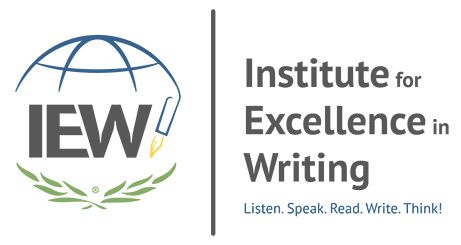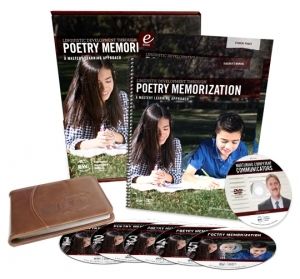
Not long thereafter a package arrived in the mail containing Linguistic Development through Poetry Memorization.
If you've been reading my blog through the years, you know by now that I like products from IEW. They make quality products, and they present their CDs and DVDs in quality packaging. Look at that disk storage case! I don't think it is real leather, but it is beautiful!
The disc case contains five audio CDs (recordings of the poems for memorization) and a DVD of Andrew Pudewa giving a presentation called Nurturing Competent Communicators.
The program also comes with a spiral-bound Teacher's Edition,
as well as a digital e-book of the student edition. Having a digital student means you can download and print as many copies as you need for the number of students/children you have in your family! You also have the option of purchasing a spiral-bound student edition from IEW if you want one! IEW was very generous to Crew members and sent a printed copy of the Student Pages in addition to the full set of Linguistic Development through Poetry Memorization.
The glossy cover is causing light glare, so I apologize that it is not a crisp photo. The book covers are beautiful!
In addition to all the items included in Poetry Memorization, the package includes downloadable material for the teacher/parent! Following instructions included in the teacher edition, you can download and listen to the following seven MP3 files:
- Nurturing Competent Communicators (mp3 of the message included on DVD);
- Mastery Learning, Ability Development, and Individualized Education;
- Ten Thousand Times and Then Understanding;
- On Listening;
- On Speaking;
- On Reading; and
- On Writing.
Isn't that amazing, how much is included in the Poetry Memorization package? I love the way IEW is working to equip parents in the task of educating their children!
So let me tell you about Poetry Memorization. This is a program that can be used with students from the very earliest grades! Nevertheless, it can also be used right up into the high school grades. The younger students will probably go through the entire program at a slower pace than the older students, but not necessarily. Every student is different, and some younger students, those in the "sponge" age (memorization stage of learning) might actually find it easier to memorize than some older students who have many difficult high school courses and outside distractions simultaneously. (My son has been distracted by college English, Algebra 2, Chemistry, History, Aeronautics, Boy Scouts and Civil Air Patrol, and more!)
When I received Poetry Memorization, I initially assumed we'd jump into the program at a level commiserate with my son's grade level or something. Like a good homeschool mom, though, I started by opening the Teacher's Manual and reading the Introduction. The material makes it very clear that all students, regardless of age, begin at the very beginning. Well, at least there is no ambiguity.
Before I gave my son his first poem, I also watched the Nurturing Competent Communicators DVD. Very inspiring! I was ready to go!
We both had Ooey Gooey memorized on day 1. The recommended pace to cover the poems is one poem per week. It is expected that older students starting the course at the beginning will go at a faster pace initially. I was feeling good. ("We've 'got' this!") I liked the worm picture and colored it in, since my son's not usually much of one for coloring.
We got to poem 2 the same week. Again, very easy poem. I'm feeling good about our progress. At this time my son was neck-deep in his college class, English 101, so I willingly dropped the pace to make sure this stays fun for him. The method of easy learning in this memorization course calls for reading the poem every day, listening to the audio CDs to recite the poem together. You practice the poem every day until the student *owns* the content. The poems become progressively harder, and it is okay to move on to the next poem before the student totally remembers the poem because you continue to practice the poems you have already memorized.
We did not do perfectly at practicing the poems every day initially, but we got better as we moved along, especially not that my son's college course is ended. One of the poems is by Hughes Mearns, and personally I am struggling with the name. It isn't bad enough that for years I thought the author was someone else; I also just have trouble wrapping my very tongue around pronouncing the name. I never thought remembering the authors might be more challenging than remembering some of the poems, but now I realize it is very true!
We are currently working on Poem 7, while continuing to review the poems that precede it. I'm really liking this program! My son... I don't think he has decided yet. I want to continue with the program either way as I am certain of the benefits to be derived from its use:
- This will build on my son's vocabulary.
- It will develop sophisticated language patterns in his brain.
- My son will learn how to correctly connect artistically crafted phrases together.
- This will help him to use the new language patterns intuitively.
- My son will be able to read new material and detect correct or awkward word usage.
- Poetry is good for the soul.
- My son will store a repertoire of poetry he can recite to entertain.
- Memorization of this poetry will help my son in other subjects because of neuron connections his brain will be making from memorizing poems!
I'm really excited about the potential long term benefits! I'm also longing to hear my son recite from memory some of the later pieces, but I'm going to bide my time and let him get there with no short-cuts. I still can't wait!
Poetry Memorization is divided into five sections with 20 poems per section. It can take years to complete the program. (A school year has 36 weeks. The program has 100 poems. At one poem per week it takes almost three years.)
I found the Teacher's Edition has an Appendix 1 with short biographies of the authors of the poems in the program, which is nice. Appendix 2 is a bibliography, and Appendix 3 gives lesson enhancement ideas.
I haven't listened to all the audio MP3 downloads yet. With summer looming ahead of me, I am looking forward to some quality beneficial listening! I am also hoping I can get my son to continue to work on the memorization through the summer at... whatever pace! I'm loving the poems. They're light and funny right now. Later in the program there are some great pieces I can't wait to memorize. Some are poems my son memorized in the past, but does not remember.
Linguistic Development through Poetry Memorization, by Andrew Pudewa and IEW, gets two thumbs up from this Momma. My son likes Andrew Pudewa but has not given me a positive opinion of the program. Then again, he hasn't complained, which probably a compliment considering my son. I recommend you consider this program for your own homeschool, regardless of the age(s) of your student(s).
Other members of the Review Crew also reviewed this product. To see other product reviews, please click the button below.










